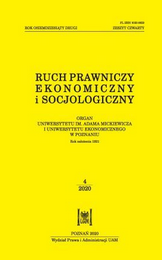DOMNIEMANIE PRAWDZIWOŚCI DEKLARACJI PODATKOWEJ I JEGO ZNACZENIE DOWODOWE
THE PRESUMPTION OF THE CORRECTNESS OF A TAX RETURN AND ITS EVIDENTIAL SIGNIFICANCE
Author(s): Adam NitaSubject(s): Law on Economics, Fiscal Politics / Budgeting
Published by: Uniwersytet Adama Mickiewicza
Keywords: presumption; burden of proof in tax law;
Summary/Abstract: Presumption is a legal construction known in diverse branches of law – both private and public law. However, one of the aspects connected with applications of this structure in tax law is the presumption of the truthfulness of the tax declaration. This is regulated in general tax law (in the Tax Ordinance) and in special tax law (for example in the VAT law act). In making it a legal presumption, the legislator assumes the truthfulness of all the data which make up the content of the tax declaration submitted by a taxpayer. This concerns both declarations which only inform the tax administration about the tax base of a particular person, as well as declarations which include a so-called self-assessment, made by a taxpayer. The author considers the essence of presumption as a legal construction, the reason for such a regulation in the tax law, and presents its consequences. In the opinion of the author, one outcome is that the burden of proof principally falls on the tax authorities which impugn the tax declaration. It concerns all of elements of chargeable event, the fulfilment of which by a taxpayer creates the tax obligation. Therefore, the author is an opponent of dividing the burden of proof in tax law. According to this idea, some elements of tax event that are beneficial for a tax debtor, because they reduce the amount of tax (for example, costs in income tax, tax relief or input tax in value added tax) should be proven by a taxpayer. However, improving of other parts of the chargeable event would be the duty of the tax authorities.
Journal: Ruch Prawniczy, Ekonomiczny i Socjologiczny
- Issue Year: 82/2020
- Issue No: 4
- Page Range: 173-186
- Page Count: 14
- Language: Polish

